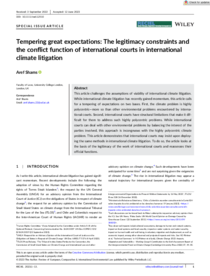Tempering great expectations: the legitimacy constraints and the conflict function of international courts in international climate litigation

2023
Early View
1-13
climate change ; judicial procedure ; international court
Law
https://doi.org/10.1111/reel.12510
English
Bibliogr.
"This article challenges the assumptions of viability of international climate litigation. While international climate litigation has recently gained momentum, this article calls for a tempering of expectations on two bases. First, the climate problem is highly polycentric—more so than other environmental problems encountered by international courts. Second, international courts have structural limitations that make it difficult for them to address such highly polycentric problems. While international courts can deal with other environmental problems by balancing the interest of the parties involved, this approach is incongruous with the highly polycentric climate problem. This article demonstrates that international courts may insist upon deploying the same methods in international climate litigation. To do so, the article looks at the basis of the legitimacy of the work of international courts and reassesses their official functions."
Digital
The ETUI is co-funded by the European Union. Views and opinions expressed are however those of the author(s) only and do not necessarily reflect those of the European Union or the ETUI.